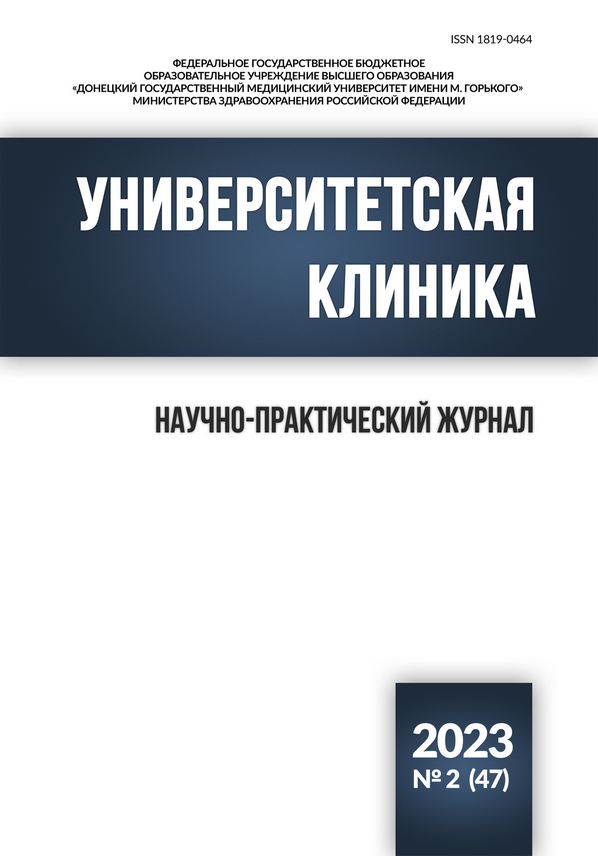ВОЗМОЖНОСТИ ВЫБОРА САХАРОСНИЖАЮЩИХ ПРЕПАРАТОВ У БОЛЬНЫХ С САХАРНЫМ ДИАБЕТОМ 2 ТИПА И СИНДРОМОМ РАЗДРАЖЕННОГО КИШЕЧНИКА
Аннотация
Сахарный диабет (СД) 2 типа имеет высокую распространенность, весомую опасность в развитии заболевания представляет формирование осложнений на микро- и макрососудистом уровне. Указанные осложнения отрицательно влияют на прогноз пациента, значительно снижая эффективность терапии. Кроме нарушений микро- и макроциркуляции выделяют и функциональные нарушения, которые ассоциированы с СД 2 типа, в частности, синдром раздраженного кишечника (СРК), который отмечается у 15-35% пациентов. Вопрос остается неизученным, в связи с чем высокую актуальность приобретают исследования переносимости и клинико-лабораторных эффектов препаратов групп иДПП-4 и арГПП-1 у лиц с сочетанием СД 2 типа и СРК. В исследование вошли 86 больных (38 – 44,2% мужчин и 48 – 55,8% женщин в возрасте от 38 до 65 лет, средний возраст – 48,9±9,4 лет) с СД 2 типа и наличием клинических проявлений СРК. Давность диабета составила 6,9±2,6 лет, уровни гликированного гемоглобина (HbA1C) – 7,93±0,51%. Артериальная гипертония имелась у 14 (16,3%) больных, диабетические макро- и микрососудистые осложнения – у 29 (33,7%), в т.ч. ретинопатия – у 9 (10,5%), нефропатия – у 11 (12,8%), ишемическая болезнь сердца – у 17 (19,8%). У всех больных был установлен диагноз СРК. Пациенты были разделены на три группы (А, В, С) в зависимости от исходного уровня гликированного гемоглобина. Среди наблюдавшихся больных СРК с диареей был диагностирован в 44 (51,2%) случаях, СРК с запорами – в 29 (33,7%), смешанный тип – в 8 (9,3%), недифференцированный – в 5 (5,8%). Проспективное исследование показало, что существует возможность безопасно использовать сахароснижающие средства у пациентов с СРК в сочетании с СД 2 типа. Во всех исследуемых группах гликемия значительно снизилась, было оказано положительное воздействие на клинические симптомы СРК. У пациентов, применяющих комбинацию иДПП-4 с метформином и арГПП-1 с метформином в сравнении с изолированным применением метформина степень благоприятного влияния была выше, что одновременно позволяло как контролировать гликемию, так и положительным образом повлиять на симптомы СРК.
Литература
2. Игнатенко Г.А., Багрий А.Э., Оприщенко А.А. Сахарный диабет: руководство для врачей. Донецк: РБ Позитив; 2022. 640.
3. Шестакова М.В., Викулова О.К., Железнякова А.В. и др. Эпидемиология сахарного диабета в Российской Федерации: что изменилось за последнее десятилетие? Терапевтический архив. 2019; 91 (10): 4-13.
4. American Diabetes Association. ADA Standards of Medical Care in Diabetes-2021. Diabetes Care. 2021; 44 (Suppl.1): S1-232. doi: 10.2337/dc21-S001
5. Игнатенко Г.А., Мухин И.В., Зубрицкий К.С., Паламарчук Ю.С., Белевцова Э.Л. Влияние разных режимов терапии на проявления аритмического синдрома у больных сахарным диабетом 2-го типа. Медико-социальные проблемы семьи. 2021; Т. 26, 4: 49-56.
6. Осипенко М.Ф., Воронцова Е.С., Жук Е.А. и др. Гастроэнтерологические симптомы при сахарном диабете 2 типа. Экспериментальная и клиническая гастроэнтерология. 2015; 115 (3): 84-89.
7. Рунова А.А., Жулина Л.И., Калинникова Л.А. и др. Особенности терапии синдрома раздраженного кишечника у больных сахарным диабетом 2 типа. Экспериментальная и клиническая гастроэнтерология. 2015; 117 (5): 105-106.
8. Mearin F., Lacy B.E., Chang L., et al. Bowel disorders. Gastroenterology. 2016; 150: 1393-1407.
9. Guangyao Li, Crjwley M.J., Tang H., Yang J.Y. et al. Dipeptidyl peptidase inhibitors and risk of inflammatory bowel disease among patients with type 2 diabetes: a meta-analysis of randomizes controlled trials. Diabetes Care. 2019; 42: e119-e121. doi: 10.2337/dc18-1578
10. Perry P., Kapur N., Barrett T.A. DPP-4 as a novel biomarker for inflammatory bowel disease: is it ready for clinical use? Inflamm. Bowel Dis. 2020; 26: 1720-1721.
11. Ивашкин И.Т., Маев И.В., Шелыгин Ю.А., Баранская Е.К., Белоус С.С. и др. Диагностика и лечение синдрома раздраженного кишечника (Клинические рекомендации Российской гастроэнтерологической ассоциации и Ассоциации колопроктологов России). Рос. Журн. Гастроэнтерол. Гепатол. Колонопроктол. 2021; 31 (5): 76-93.
12. Vasant D.H., Paine P.A., Black C.J., Houghton L.A. et al. British Society of Gastroenterology guidelines on the management of irritable bowel syndrome. Gut. 2021; 79: 1-27. doi: 10.1136/gutjnl-2021-324598
13. Wlodarchuk J., Waeniewska A., Fichina J., Dziki A. еt al. Current overview on clinical management of chronic constipation. J Clin Med. 2021; 10 (8): 1738. doi: 10.3390/jcm10081738
14. Arasaradnam R.P., Brown S., Forbes A., Fox M.R. et al. Guidelines for the investigation of chronic diarrhoea in adults: British Society of Gastroenterology, 3rd edition. Gut. 2018; 67: 1380-1399. doi: 10.1136/gutjnl-2017-315909
15. Игнатенко Г.А., Багрий А.Э., Сабельникова Я.С., Аршавская И.А., Голодников И.А., Андрусяк А.Ю. Выбор гипотензивной терапии у больных с сахарным диабетом 2 типа. Практическая медицина. 2022; Т. 20, 5: 7-12.
16. Багрий А.Э., Щукина Е.В., Михайличенко Е.С. и др. Современные медикаментозные подходы к контролю гликемии у больных сахарным диабетом 1 и 2 типов. Фарматека. 2021; 28 (4): 74-95.
17. Маев И.В., Самсонов А.А., Дичева Д.Т. и др. Клинико-функциональные нарушения верхних отделов пищеварительного тракта у больных сахарным диабетом 2-го типа. Эффективная фармакотерапия. 2019; 15 (18): 10-14.
18. Шкляев А.Е., Пантюхина А.С., Бендерская Е.Ю. Качество жизни больных с синдромом раздраженного кишечника в процессе лечения. Здоровье и образование. 2017; 10: 143-145.
19. Bajaj A. The variable portability – irritable bowel syndrome. EC Gastroenterology and Digestive system. 2020; 7 (2): 1-9.
20. Игнатенко Г.А., Багрий А.Э., Приколота О.А., Приколота А.В., Могилевская К.Э. Сахароснижающая терапия и течение постковидного синдрома, есть ли связь? Архивъ внутренней медицины. 2023; Т. 13, 2 (70): 129-135.
21. Abrahami D., Douros A., Yin H., Hoi Yun Yu O et al. Dipeptidyl peptidase-4 inhibitors and incidence of inflammatory bowel disease among patients with type 2 diabetes: population based cohort study. British Medical Journal. 2018; 360: k872. doi: 10.1136/bmj.k872
22. Yazbeck R., Howarth G.S., Geier M.S., Demuth H.U., Abbott C.A. Inhibiting dipeptidyl peptidase activity partially ameliorates colitis in mice. Front Biosci. 2008; 13: 6850-6858. doi: 10.2741/3193
23. Karhus M.L., Bronden A., Roder M.E. et al. Remission of bile acid malabsorption symptoms following treatment with the glucagon-like peptide 1 receptor agonist liraglutide. Gastroenterology. 2019; 157: 569-571.
24. Ford AC, Lacy BE, Talley NJ. Irritable bowel syndrome. N Engl J Med. 2017; 376: 2566-2578.
25. Ford A.C., Moayyeddi P., Chey W.D., Harris L.A., Lacy B.E. et al. American College of Gastroenterology monograph on management of irritable bowel syndrome. Am. J. Gastroenterol. 2018; 113: 1-18. doi: 10.1038/s41395-018-0084-x
26. Петри А., Сабин К. Наглядная медицинская статистика. М: ГЭОТАР-Медиа; 2021. 224.




